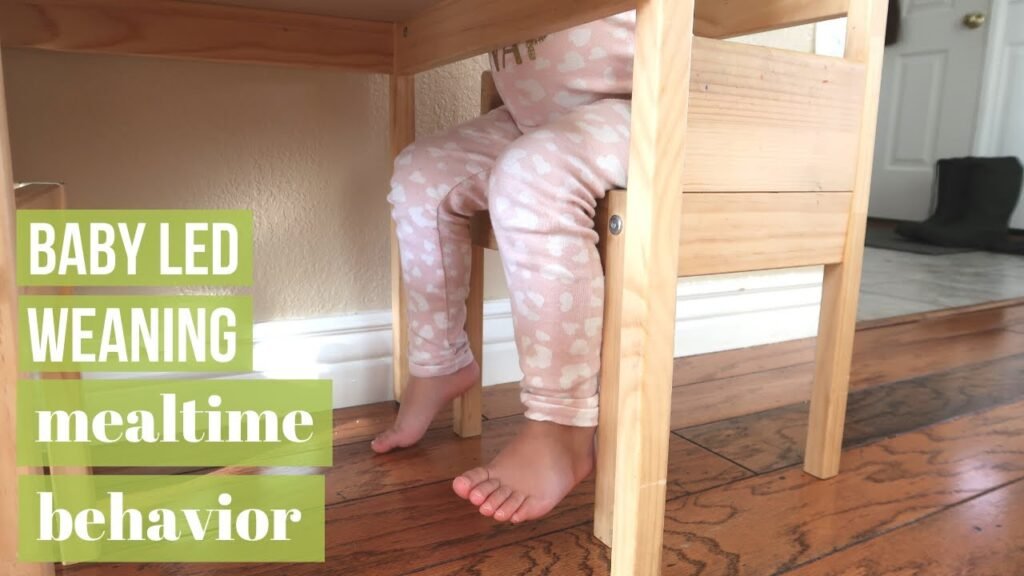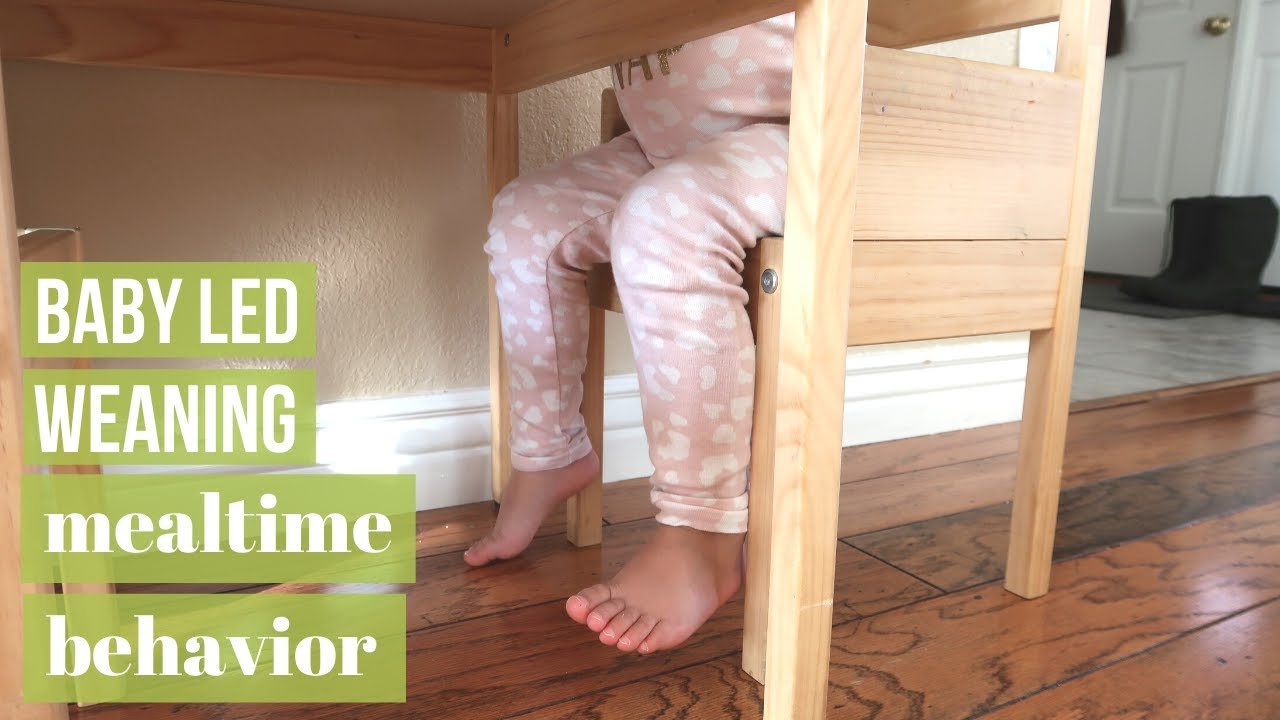Ashley, a mother of two girls, Kylie and Mia, shares her experiences and tips on managing behavior expectations during baby led weaning in a video by Hapa Family. From dealing with common behaviors of babies and toddlers during mealtimes to offering advice on Montessori practices and consistency, Ashley covers it all. With a focus on utensils, food playing, spitting, and leaving the table, she outlines strategies like patience, redirection, and setting limits tailored to various developmental stages.
Throughout the video series on baby led weaning, Ashley emphasizes the importance of following child-centered approaches like Montessori practices. By tailoring responses to behaviors based on a child’s age and unique needs, she believes that parents can create successful mealtime experiences. From guiding infants experimenting with cups to setting boundaries on food playing for toddlers, Ashley’s tips aim to support parents in managing behavior expectations during the weaning process.

Understanding Baby Led Weaning
Benefits of Baby Led Weaning
Baby Led Weaning (BLW) is a feeding method that allows babies to feed themselves. This approach encourages the development of fine motor skills, promotes healthy eating habits, and helps babies explore different tastes and textures. By giving babies control over their eating, BLW can also prevent picky eating habits later in life.
Introduction to BLW
BLW is a popular feeding method that involves introducing solid foods to babies in a way that allows them to feed themselves right from the start. This method promotes independence and helps babies develop their motor skills and self-regulation when it comes to eating. BLW eliminates the need for purees or spoon feeding, allowing babies to explore and enjoy a wide variety of foods at their own pace.
Basic Principles of BLW
The core principles of BLW involve introducing solid foods that are suitable for the baby’s age and stage of development. It is essential to offer a variety of foods to ensure balanced nutrition and encourage healthy eating habits. BLW emphasizes the importance of providing safe and appropriate foods for babies to self-feed, promoting positive mealtime experiences.
Behavioral Expectations During Baby Led Weaning
Importance of Managing Behavior
Behavior management during BLW is crucial for a positive feeding experience. By setting clear expectations and responding appropriately to behaviors, parents can help babies develop healthy eating habits and positive mealtime behaviors. Managing behavior also ensures safety during self-feeding.
Factors Influencing Behavior
Several factors can influence a baby’s behavior during BLW, including age, developmental stage, hunger level, and temperament. Understanding these factors can help parents respond effectively to different behaviors and promote a positive feeding environment.
Age and Developmental Stage Considerations
Age and developmental stage play a significant role in how parents manage behavior during BLW. Younger babies may have different behaviors compared to older infants or toddlers. It is essential to consider the baby’s age and abilities when setting expectations and responding to behaviors during mealtimes.
Common Behavior Concerns
Use of Utensils
Babies may display curiosity and experimentation with utensils while self-feeding. Parents should be patient and provide guidance as babies learn to use cups, spoons, and forks. With practice and redirection, babies will develop their fine motor skills and become more proficient in using utensils.
Playing with Food
Exploring and playing with food is a natural part of learning for babies. While it may be messy, allowing babies to engage with food enhances their sensory experience and encourages independence. Setting boundaries for older children can help establish rules around playing with food during mealtimes.
Spitting
Spitting out food is a common behavior during BLW, especially when babies are exploring new tastes and textures. Parents should remain calm and encourage babies to keep trying different foods. Over time, babies may become more accepting of new flavors and textures, reducing the tendency to spit out food.
Throwing Food
Throwing food during mealtimes can be frustrating for parents, but it is a common behavior in young children. Setting limits and redirecting the child’s focus can help discourage food throwing. Providing praise and positive reinforcement for eating behavior can also help reduce the habit of throwing food.
Leaving the Table
Babies and toddlers may show disinterest in sitting at the table for meals, leading to attempts to leave the dining area. Setting expectations for staying seated during mealtimes and offering engaging activities or distractions can help keep children at the table. Consistency in behavior management is key to establishing positive mealtime routines.
Strategies for Managing Behavior
Patience
Practicing patience is essential when managing behavior during BLW. Babies and toddlers are still learning and exploring, so patience is key to supporting their development and independence. Remaining calm and offering encouragement can help babies navigate feeding challenges.
Redirection
Redirecting a child’s focus from undesirable behaviors to more appropriate activities can help manage behavior during BLW. Providing alternative options or engaging activities can help shift the child’s attention and encourage positive mealtime behaviors.
Offering Less Food
Offering smaller portions or bite-sized pieces of food can prevent babies from feeling overwhelmed during mealtimes. By providing manageable amounts of food, parents can help babies focus on self-feeding and prevent frustration or disinterest in eating.
Setting Limits
Establishing clear boundaries and expectations can help manage behavior during BLW. Setting limits on food-related behaviors such as throwing or playing with food can encourage positive mealtime habits. Consistency in enforcing limits is essential for reinforcing behavior expectations.
Consistency in Behavior Management
Importance of Consistency
Consistency in behavior management is essential for establishing routines and promoting positive mealtime behaviors. By setting clear expectations and consistently enforcing rules, parents can help babies develop healthy eating habits and self-regulation skills.
Benefits of Setting Expectations
Setting clear expectations for behavior during BLW can help babies understand mealtime routines and learn appropriate mealtime behaviors. Consistent reinforcement of expectations can promote self-regulation and independence in feeding, leading to positive eating habits in the long run.
Following Montessori Practices
Montessori principles emphasize following the child’s lead and promoting independence in various aspects of life, including mealtime. By incorporating Montessori practices into BLW, parents can support babies’ self-feeding skills and encourage autonomy in choosing and exploring food.
Tips for Handling Behavior When Traveling
Bringing Necessary Supplies
When traveling with a baby or toddler, it is essential to pack essential feeding supplies such as utensils, bibs, and portable food options. Being prepared with familiar items can help maintain mealtime routines and promote positive feeding behaviors even while away from home.
Maintaining Mealtime Routines
Despite changes in location or schedule, parents should strive to maintain consistent mealtime routines when traveling. Offering familiar foods and following established mealtime practices can help babies feel secure and comfortable during feeding times, reducing the likelihood of behavior disruptions.
Adjusting Expectations
Traveling can introduce new experiences and challenges for babies, leading to changes in behavior. Parents should be flexible and adjust mealtime expectations based on the circumstances to accommodate the baby’s needs and preferences. Maintaining a positive and relaxed attitude can help manage behavior effectively during travel.
Personal Experiences and Tips
Sharing Personal Stories
As a parent who has experience with BLW, sharing personal stories can provide insights and practical tips for managing behavior during mealtime. By recounting experiences and challenges faced with self-feeding, parents can offer valuable advice and reassurance to others navigating BLW with their babies.
Tips for Success
Providing tips for success in managing behavior during BLW can help parents feel more confident and prepared for feeding challenges. Practical suggestions and strategies based on personal experiences can offer guidance and support to parents seeking to establish positive mealtime behaviors with their babies.
Lessons Learned
Reflecting on lessons learned from personal experiences with BLW can offer valuable insights and perspectives on behavior management. By sharing successes, setbacks, and adjustments made along the way, parents can convey the importance of flexibility and patience in navigating feeding challenges with babies.
Conclusion of Video Series
Recap of Behavior Management Strategies
In conclusion, managing behavior during BLW requires patience, consistency, and understanding of the factors influencing a baby’s eating behaviors. Setting clear expectations, offering guidance, and following Montessori principles can promote positive mealtime experiences and healthy eating habits.
Invitation to Explore Other Videos
For more information and tips on BLW and behavior management, viewers are encouraged to explore other videos in the series. By delving deeper into specific topics related to feeding and parenting, parents can gain valuable insights and strategies for supporting their babies through the self-feeding journey.
Closing Remarks
As the video series on BLW behavior expectations comes to a close, it is essential to remember that every baby is unique, and behavior management may vary from child to child. By incorporating patience and consistency into feeding routines, parents can create a positive and supportive environment for their babies to explore, learn, and grow through self-feeding. Thank you for watching and best of luck on your BLW journey!

